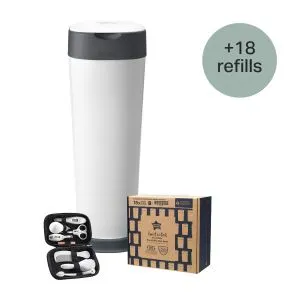
Ultimate XL Nappy Disposal Bundle with 18 Refills
Bundle & Save 40%
Subscription orders can be cancelled at anytime. Free delivery on all subsequent subscription orders. Find out more about subscriptions.
They’re easy and fuss free
Your products are automatically sent to you
You save up to 10% when you sign up for a subscription
You can cancel at any time

Most babies and toddlers like to have something (a comforter, dummy, or cuddly toy) that helps them feel secure as they fall asleep.
But are there any problems with children using comfort items when sleeping? And can a newborn sleep with a dummy? We've written this post to help you learn more about dummies and other baby comforters and sleep.
Sucking is a natural reflex that babies use to feed and comfort themselves. While soothers (or dummies) are not an automatic substitute for cuddles, comfort and feeding when your baby is hungry, they are pretty good at helping them to settle and relax.
If your baby is comforted by sucking, then offering a soother at naptime and bedtime can help them sleep.
Bottle-fed babies can sleep with a dummy from birth. But if you’re breastfeeding, it’s widely recommended that you wait until they are at least 3 to 4 weeks old and have settled into a comfortable breastfeeding routine with no latching issues before introducing a soother into their routine.
A soother at bedtime may encourage your baby to soothe themselves back to sleep. But you may find yourself being summoned when they lose it in the night. If you don’t want to spend your evening hunting for a dropped dummy, try a glow-in-the-dark soother.
Some studies show that giving your baby a soother when putting them down to sleep might reduce the chance of sudden infant death syndrome (SIDS). According to the Lullaby Trust, it's not clear what it is about a dummy that may help reduce the chance of a baby dying of SIDS.
Research has also found that if a baby used to having a dummy, isn't given one on a particular occasion, the degree of protection may be less than during sleep periods when a dummy is given. So, if your baby uses a dummy as part of their general routine, you should aim to offer them their dummy each time you put them down for sleep, day or night.
Whether you do or don’t give your baby a dummy at bedtime, you should always follow safe sleep guidance (such as not smoking and placing your baby on their back to sleep) to significantly lower the chance of SIDS.
Explore the Range
Comfort items, also known as comfort objects, can be very useful in helping older babies and toddlers settle and fall asleep.
Things like soft comforters and cuddly toys can also help them feel more secure when they're away from you. That's why they're known as transitional objects. They help your child transition from one state to another (e.g. waking to sleeping) and provide feelings of comfort and security when a baby or toddler is away from familiar people and surroundings.
Because these comforters help your child feel safe, calm and happy, you shouldn't discourage them. They are a sign that your child is developing skills to help them become a little more independent.
It is not safe for babies under the age of 12 months old to sleep with blankets. If your child uses a soft comforter or toy to help them sleep, it must be safe for them to do so.
You should follow safe sleep guidance, and remove the comfort item from their sleeping area, cot or bed once they’re asleep. Never leave your baby unattended with anything that has a cord or ribbon attached to it, or any toy with parts that may come off when sucked and chewed (e.g. teddy's nose or eyes).
Most babies and toddlers will choose their comfort item at around 6 months old. They tend to choose something with a soft texture and a familiar smell, such as a favourite toy or a small comforter with a cute character on.
If your child doesn't choose something themselves, there's no need to encourage it, but a comfort object may be worth a try if they don't sleep well. Although babies and toddlers choose their comfort item early, you may notice that they need it more aged between 18 months and 2 ½ years old.
Parents sometimes worry that their child will become so attached to a comforter that they become inconsolable without it. Losing that precious toy or comforter can then become a real source of stress.
If your child is particularly attached to a comfort item, it's a good idea to have another one in reserve. Remember to alternate them so each comforter is equally worn and picks up the same kind of smells.
Most children will gradually wean themselves off their favourite comfort object, with it gradually becoming less important as they develop their independence.